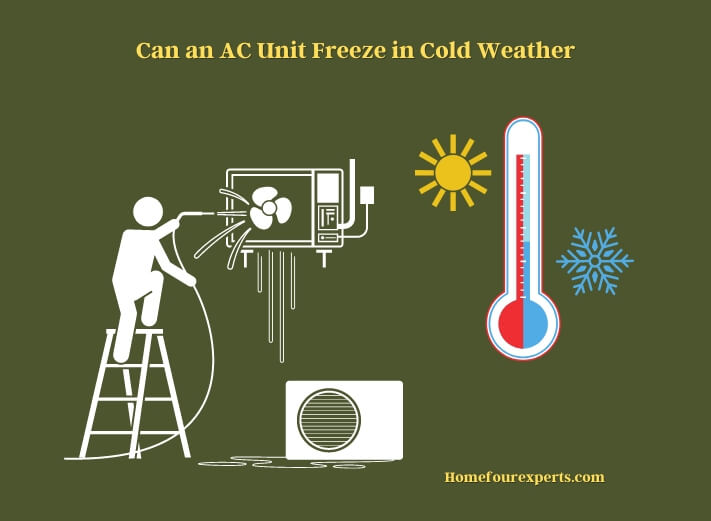Published on: May 30, 2023
Written by Eric Devin / Fact-checked by David Rowan
An air conditioning unit operates by utilizing a refrigeration cycle to remove heat from the indoor environment and transfer it outside. The key components of this process are the evaporator, compressor, condenser, and expansion valve. The refrigerant, a vital substance within the system, cycles through these components, changing states from liquid to gas and back again, effectively absorbing and releasing heat.

The Causes of AC Unit Freezing in Cold Weather
While it may seem counterintuitive, AC units can freeze in cold weather. This can occur for several reasons, including:
Low refrigerant levels: A leak or insufficient refrigerant levels can cause the evaporator coil to become too cold, leading to ice formation on the coil and the surrounding components.
Restricted airflow: If there is insufficient airflow across the evaporator coil, the refrigerant within the coil will not absorb enough heat, resulting in a drop in temperature and subsequent freezing.
Malfunctioning components: A faulty expansion valve or a damaged compressor can lead to imbalances in the refrigeration cycle, causing the unit to freeze.
Running the AC in cold outdoor temperatures: Operating an air conditioner when the outdoor temperature is below 60°F (15°C) can cause the unit to freeze, as the refrigerant may not function optimally under such conditions.
Preventing an AC Unit From Freezing in Cold Weather
To avoid AC unit freezing during cold weather, consider the following preventive measures:
Regular maintenance: Schedule routine maintenance checks to ensure all components are functioning correctly and to detect any potential issues early on.
Properly sizing your AC unit: An appropriately sized air conditioner will operate efficiently and effectively, reducing the likelihood of freezing.
Maintaining adequate airflow: Clean or replace air filters regularly and ensure there are no obstructions in the ductwork or vents.
Monitor refrigerant levels: Have a qualified technician check the refrigerant levels and inspect for any leaks in the system.
Avoid running the AC in cold temperatures: Refrain from operating your air conditioner when outdoor temperatures are below 60°F (15°C). Instead, consider using a heat pump, which can provide both heating and cooling functions, and is designed to work efficiently in lower temperatures.
What to Do When an AC Unit Freezes in Cold Weather
If your AC unit freezes in cold weather, follow these steps to address the issue:
Turn off the unit: Immediately switch off the air conditioner to prevent further damage and allow the ice to melt.
Inspect the system: Check for any visible issues, such as blocked vents or dirty filters, and address them accordingly.
Call a professional: If the problem persists or you suspect a more complex issue, contact a qualified technician to assess and repair the system.
Consider preventative measures: Once the issue has been resolved, implement the preventive measures outlined above to reduce the risk of freezing in the future.
The Impact of a Frozen AC Unit on Energy Efficiency and Indoor Comfort
A frozen AC unit not only compromises the system’s functionality but also impacts its energy efficiency and the overall comfort of the indoor environment. Frozen components can cause the air conditioner to work harder, consuming more energy and increasing utility bills. Moreover, a frozen unit is unable to effectively remove heat and humidity from the indoor air, resulting in an uncomfortable living space.
Conclusion
In summary, an AC unit can freeze in cold weather due to various factors, such as low refrigerant levels, restricted airflow, malfunctioning components, or running the unit in cold outdoor temperatures. To minimize the risk of a frozen AC unit, it is essential to implement preventive measures such as regular maintenance, proper sizing of the AC unit, maintaining adequate airflow, monitoring refrigerant levels, and avoiding running the AC in cold temperatures. By addressing these factors, you can ensure the efficient operation of your air conditioner, optimize energy consumption, and maintain a comfortable indoor environment.
Selecting the Right HVAC System for Cold Weather Climates
For homeowners living in regions with colder climates, it’s crucial to choose an HVAC system that can effectively handle both heating and cooling needs. Heat pumps are an excellent option, as they can reverse the refrigeration cycle to provide heating during colder months. These systems are designed to work efficiently in low temperatures and can help maintain optimal indoor comfort throughout the year.
The Benefits of a Heat Pump in Cold Weather Climates
Energy efficiency: Heat pumps use electricity to move heat from one place to another, making them more energy-efficient than traditional furnaces and air conditioners.
Year-round comfort: A heat pump can both heat and cool your home, making it a versatile solution for maintaining indoor comfort in various weather conditions.
Environmentally friendly: As heat pumps do not burn fossil fuels, they produce fewer greenhouse gas emissions compared to traditional heating systems.
Lower utility bills: The energy efficiency of heat pumps can result in lower monthly utility bills, providing long-term cost savings for homeowners.
Quiet operation: Heat pumps are generally quieter than furnaces and air conditioners, contributing to a more peaceful indoor environment.
Maintaining Your Heat Pump for Optimal Performance
To ensure your heat pump operates efficiently throughout the year, follow these maintenance tips:
Schedule regular maintenance: Have a professional technician inspect and service your heat pump annually to detect any potential issues and ensure optimal performance.
Clean or replace filters: Regularly check and clean the filters on your heat pump, replacing them as necessary to maintain proper airflow and efficiency.
Inspect outdoor unit: Keep the area around the outdoor unit clear of debris, snow, and ice to ensure unobstructed airflow.
Check refrigerant levels: Have a technician monitor refrigerant levels in your heat pump to ensure optimal performance and avoid potential freezing issues.
Final Thoughts
Understanding the factors that contribute to AC unit freezing in cold weather and taking the necessary preventive measures can help you maintain the efficiency and longevity of your HVAC system. In colder climates, consider investing in a heat pump to provide both heating and cooling functions while optimizing energy consumption and indoor comfort.
Read more:
- Can a Rubber Roof Be Installed in Cold Weather?
- Can a Windshield be Replaced in Cold Weather?
- Will Drywall Crack in Cold Weather?
About This Writer

Hi, I am Eric Devin and I am a professional interior architect. Since childhood, I've always enjoyed DIY projects! And, I have loved to solve simple household problems using essential tools and equipment. I have also acquired a lot of information about basic household tools settings by working with contractors.